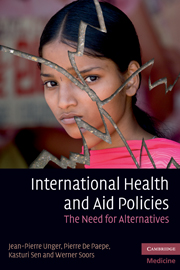Book contents
- Frontmatter
- Contents
- Preface
- Biographies
- Notices
- Acknowledgements
- List of abbreviations
- Reviews
- Introduction: Overview and purpose
- Section 1 Paradigms of international policies
- Section 2 The failure of the aid paradigm: poor disease control in developing countries
- Section 3 Impact of international health policies on access to health in middle-income countries: some experiences from Latin America
- Section 4 Determinants and implications of new liberal health policies: the case of India, China and Lebanon
- Section 5 Principles for alternative, publicly oriented health care policies, planning, management and delivery
- Section 6 A public health, strategic toolkit to implement these alternatives
- Conclusions
- Glossary
- Index
Section 3 - Impact of international health policies on access to health in middle-income countries: some experiences from Latin America
Published online by Cambridge University Press: 06 December 2010
- Frontmatter
- Contents
- Preface
- Biographies
- Notices
- Acknowledgements
- List of abbreviations
- Reviews
- Introduction: Overview and purpose
- Section 1 Paradigms of international policies
- Section 2 The failure of the aid paradigm: poor disease control in developing countries
- Section 3 Impact of international health policies on access to health in middle-income countries: some experiences from Latin America
- Section 4 Determinants and implications of new liberal health policies: the case of India, China and Lebanon
- Section 5 Principles for alternative, publicly oriented health care policies, planning, management and delivery
- Section 6 A public health, strategic toolkit to implement these alternatives
- Conclusions
- Glossary
- Index
Summary
Introduction to Section 3
In this section we question why markets in health care have been so compelling to policy makers, globally and nationally, and scrutinize the evidences to commodify health care delivery in MICs such as those covered in this section. Thus the experience of health sector reforms in three Latin American countries has been presented here in order to understand the nature of the reforms and their variance in impact on health care. This section focuses on primary and secondary data on national health systems, hospitals and first-line health services. We illustrate how global policies shaped both health services and systems, in addition to the pressures placed upon countries to adopt them and explore the extent to which these functioned to serve health needs and demand for access to health care.
Health policies in Costa Rica (Section 3, Chapter 6) have followed the principles of equity and solidarity to strengthen access to care through public services and universal health insurance. The role of the for-profit sector has been limited. Boosted by the robust performance of the public health system, Costa Rica has achieved health status comparable to the most developed countries. Compared to this, in Columbia the health sector was privatized in line with the internationally advocated paradigm (Section 3, Chapter 7). Even following 15 years of implementation the reforms could not deliver the declared goals of universal coverage and equitable access to high quality care, despite an explosion in both public and private expenditures. Furthermore, most key health indicators have deteriorated.
- Type
- Chapter
- Information
- International Health and Aid PoliciesThe Need for Alternatives, pp. 67 - 68Publisher: Cambridge University PressPrint publication year: 2010

